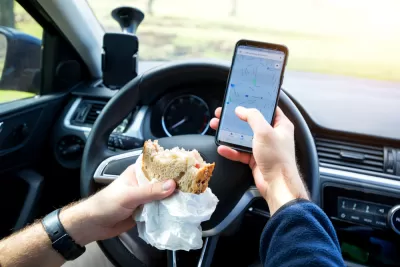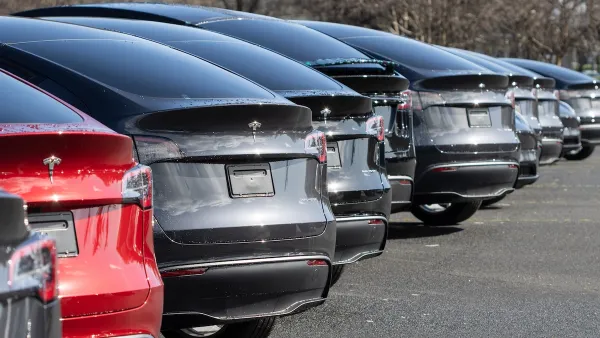Almost half of drivers using Tesla and GMC driver assist technology report feeling comfortable treating their cars as fully autonomous.

According to new research from the Insurance Institute for Highway Safety (IIHS), many Americans confuse driver assist systems with full self-driving modes, reports Rebecca Bellan in TechCrunch.
This was the conclusion of a survey that “explored habits, expectations and attitudes among regular users of General Motors Super Cruise, Nissan/Infiniti ProPILOT Assist and Tesla Autopilot.” The survey showed that “All three groups were found to be more likely to engage in non-driving related activities — like texting or eating — while using their systems than when driving manually.” Over half of Super Cruise users and 42 percent of Autopilot users “said they were comfortable treating their systems as self-driving.”
The information comes on the heels of multiple crashes involving Tesla cars using the Autopilot system. “The agency has opened a total 39 special investigations into Autopilot-related crashes since 2016, 37 of which are currently still open.” GMC’s Super Cruise was investigated twice during the same time period. “Last month, some Tesla drivers filed suit against the company for falsely advertising the autonomous capabilities of Autopilot and FSD, something California’s Department of Motor Vehicles has also recently accused Tesla of.”
Bella adds, “The study suggests that driver monitoring systems and ‘multifaceted, proactive user-centric safeguards’ are key to shaping proper behavior and understanding about drivers’ roles while using partial driving automation.”
FULL STORY: Many Americans treat driver assist systems like self-driving

Planetizen Federal Action Tracker
A weekly monitor of how Trump’s orders and actions are impacting planners and planning in America.

Chicago’s Ghost Rails
Just beneath the surface of the modern city lie the remnants of its expansive early 20th-century streetcar system.

San Antonio and Austin are Fusing Into one Massive Megaregion
The region spanning the two central Texas cities is growing fast, posing challenges for local infrastructure and water supplies.

Since Zion's Shuttles Went Electric “The Smog is Gone”
Visitors to Zion National Park can enjoy the canyon via the nation’s first fully electric park shuttle system.

Trump Distributing DOT Safety Funds at 1/10 Rate of Biden
Funds for Safe Streets and other transportation safety and equity programs are being held up by administrative reviews and conflicts with the Trump administration’s priorities.

German Cities Subsidize Taxis for Women Amid Wave of Violence
Free or low-cost taxi rides can help women navigate cities more safely, but critics say the programs don't address the root causes of violence against women.
Urban Design for Planners 1: Software Tools
This six-course series explores essential urban design concepts using open source software and equips planners with the tools they need to participate fully in the urban design process.
Planning for Universal Design
Learn the tools for implementing Universal Design in planning regulations.
planning NEXT
Appalachian Highlands Housing Partners
Mpact (founded as Rail~Volution)
City of Camden Redevelopment Agency
City of Astoria
City of Portland
City of Laramie





























